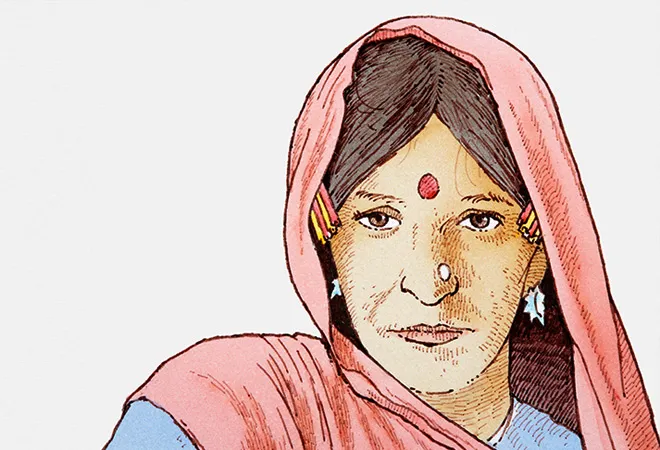-
CENTRES
Progammes & Centres
Location
Let’s try to make the home and the workplace more gender equal, build the necessary infrastructure in rural areas, pay equal salaries for equal work, and at least pay women for the outstanding work that they have done during the pandemic.
 This article is part of the series — Catalysing Change: Women-led Development in the Decade of Action.
This article is part of the series — Catalysing Change: Women-led Development in the Decade of Action.
It is that time of the year; the time to celebrate women’s achievements through sentimental success stories of women who got gold medals at the Olympics, pushed their way into corporate board rooms, managed to be the lone woman in all-male panels (so what if they got invited because they were related to an important man?) or simply pass the class tenth exam by cycling 50 km to school in a remote area. These ‘success despite all odds’ stories must be celebrated so that women get inspired to achieve more by pushing harder. Women must push harder to fight against all odds at the expense of their physical and mental well-being to achieve what would not count as an achievement for a man while the Indian society can continue to function the way it has functioned in the last five hundred years.
Sadly, gender equality and the consequent ‘opportunity to work’ has not altered the gendered division of labour in Indian homes. Women who are engaged in paid work bear the double burden of balancing work and family and seldom enjoy the respect that the male provider gets at home. Women continue to perform the bulk of the household responsibilities, which includes cooking, cleaning, child and geriatric care while chasing targets in office. While this is true the world over, the situation is worse in India because gender roles are more strictly followed in Indian joint families, there are more people who need care, complex religious rituals take up time, and constant comparisons with other women is the norm.
Liberalisation of the economy, rise in informality, and contract-based work have also made women workers more vulnerable. Women are paid poorly and are constantly scared of losing their precarious jobs. According to a study by Renana Jhabvala and Shalini Sinha, liberalisation led to a decline in work opportunities for unorganised sector women workers along with poorer work conditions in the form of lower wages, job insecurity, and a rise in casualisation.
For those employed, the workplace is rarely a free space. Indian workplaces are typically gender unfriendly and sexual harassment is rampant. Only a handful of women muster the courage to complain against violators because of fear of job loss. Though the Maternity Benefit Act 2017 mandates employers with over 50 staff to provide crèches, most workplaces in India don’t have crèche facilities.
Workplaces or schools in India don’t have proper toilet facilities either. Every year millions of adolescent girls drop out of school because of the lack of hygienic toilets in schools in rural India. Gender experts argue that the lack of clean toilet facilities in India’s big cities such as Bengaluru, Mumbai, and Pune restrict women from participating in the labour force. Women who continue to work in such insanitary conditions face significant health risks. According to a cross-sectional study on 312 women workers, health of women workers is at risk due to occupational heat exposures and inadequate sanitation facilities at many Indian workplaces. The study found work place heat exposures exceeded the threshold limit value for safe manual work for 71 percent women, 87 percent of the women who had inadequate access to toilets at workplaces reported experiencing genitourinary problems, and 10 percent of the women experienced above normal Core Body Temperature (CBT), Sweat Rate (SwR), and Urine Specific Gravity (USG).
Women workers have also been hit hardest by the pandemic and many of the economic gains made by women in the previous decades have been reversed. According to a recently released report by UN Women, the pandemic will push 96 million people into extreme poverty by 2021, out of which 47 million are women and girls. The International Labour Organisation projects that the equivalent of 140 million full-time jobs will be lost due to the pandemic and women are 19 percent more at risk than men. The pandemic-induced rise in poverty will also widen the existing gender wage gap. Despite being disproportionately represented in the health sector and being at the frontlines in the fight against COVID-19, women health workers are poorly paid. Female health workers in India were often assaulted by suspected patients and often worked without protective gear. Nurses are experiencing salary cuts and ASHAs have not received their regular stipends.
Let’s not celebrate the success stories of the handful of women who made it despite all the odds and put additional pressure on young women to fight against all odds. Instead let’s eliminate the odds so that it is not so tough for women in India to live a free life and realise their true potential. Let’s try to make the home and the workplace more gender equal, build the necessary infrastructure in rural areas, pay equal salaries for equal work, and at least pay women for the outstanding work that they have done during the pandemic. But is gender justice possible in a state where those responsible for dispensing justice justify marital rape, ask perpetrators to marry minor victims, and are themselves accused of sexual misconduct? Let’s not celebrate ‘Nari Shakti’ the patriarchal way. Let’s grieve today.
The views expressed above belong to the author(s). ORF research and analyses now available on Telegram! Click here to access our curated content — blogs, longforms and interviews.

Dr Malancha Chakrabarty is Senior Fellow and Deputy Director (Research) at the Observer Research Foundation where she coordinates the research centre Centre for New Economic ...
Read More +